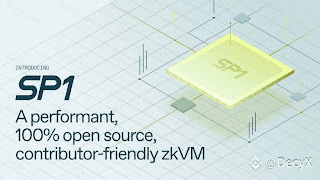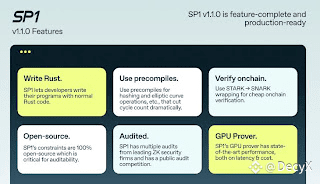Zero-knowledge has always been cool, but let’s be honest - it was hard
Circuit design, proving farms, arcane DSLs. Succinct Labs just dropped a ZK dev experience that feels more like write-and-ship than rewrite-and-stress-test

ZK more like Rust and less like rocket science
SP1 lets you build ZK programs in Rust or any LLVM-compiled language and package them into proofs. No fooling around with arithmetic constraints or domain-specific languages. It’s everyday code that compiles and proves
And it isn’t just accessible, it’s bleeding fast: benchmarks show 4–28× speedups on real-world workloads like Merkle proofs and light-clients, compared to other zkVMs
2. Precompiles: your ZK turbo boosters
SP1’s secret sauce?
A precompile-centric architecture: operations like keccak256, sha256, secp256k1/ed25519 signatures, and pairing arithmetic are super-optimized. That gives huge cycle reductions think 5–10× fewer RISC-V cycles while letting you stay in familiar code. Developers and teams like Argument (Lurk Labs) and Scroll have already forked SP1 to plug in specialized precompiles tailored to their use cases

3. Real-world speed: from hours to seconds
Want to see aggressive performance?
A Tendermint light client proof dropped from 2.2 hours to 4.6 minutes
And with the SP1 Hypercube, Ethereum block proofs have been produced in around 10 seconds on optimized GPU clusters, fast enough for real-time proving across thousands of mainnet blocks
4. Open-source and ecosystem-friendly
SP1 is 100% open-source, MIT/Apache-2.0 licensed, with a modular architecture that welcomes contributions. Teams like Polygon, Celestia, Avail, Taiko, Nebra, Hyperlane and more are building on SP1 for rollups, bridges, zk oracles, coprocessors, and aggregators.
5. Plug-in your job to the Prover Network, skip the infra
Once your code is ready, you don’t spin up an expensive proving farm. You send your ZK job to the Succinct decentralized Prover Network provers compete, you get proofs, the market handles availability. Behind the scenes, an off-chain auctioneer matches requests to provers, while settlement happens on Ethereum
• Think of it as serverless proving for Web3
6. Hardware acceleration and token mechanics
• SP1 can even run on FPGAs, giving ~20× speedups over CPU-only execution and paving the way for future ASIC acceleration
• Driving it all is the PROVE token used to pay provers, stake for security, and govern the network. This token economy aligns incentives between developers, provers, and the protocol
Why SP1 is a Dev-X Game Changer
Here’s the difference it makes for builders: instead of wrestling with circuit complexity, you just write Rust. Instead of waiting hours for proofs, you get them in minutes or even seconds
Instead of running GPU farms, you simply submit jobs to the network. Instead of lacking customization, you can extend SP1 with precompiles or even hardware acceleration
And instead of being stuck with closed-source stacks, you get a fully open-source zkVM backed by a growing ecosystem and an incentive-aligned token model
Developer’s Call-to-Action
Fork SP1 and compile a sample (like a Merkle proof or light client) in Rust.
Experiment with precompiles - add a custom hash or signature curve.
Submit a job to the Prover Network sandbox and measure proving time/cost.
Verify proofs on-chain with your target environment (EVM, Tendermint, Solana).
Join the ecosystem contribute precompiles, optimize workloads, and help expand the zk infrastructure layer
Final Thought
If you’ve been waiting for ZK to feel like real software, SP1 + the decentralized Prover Network is that breakthrough
It turns zero-knowledge from a cryptography challenge into a developer-first toolkit fast, scalable, open, and production-ready
@Succinct #SuccinctLabs $PROVE